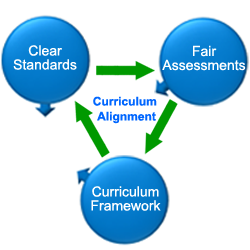Designing a Curriculum
Now that we have defined the components of a curriculum, what approaches need to be taken in order to design one? Robert Marzano identifies ten instructional design questions that are examples of some essential considerations during this process:
- What will I do to establish and communicate learning goals, track student progress, and celebrate success?
- What will I do to help students effectively interact with new knowledge?
- What will I do to help students practice and deepen their understanding of new knowledge?
- What will I do to help students generate and test hypotheses about new knowledge?
- What will I do to engage students?
- What will I do to establish or maintain classroom rules and procedures?
- What will I do to recognize and acknowledge adherence and lack of adherence to classroom rules?
- What will I do to establish and maintain relationships with students?
- What will I do to communicate high expectations for all students?
- What will I do to develop effective lessons organized into a cohesive unit?
All of these questions play a distinct role in the design of a curriculum. As teachers, many of these questions we can easily answer on a daily basis in the classroom. However, some still may need to be considered as your curriculum design continues to develop and improve.

